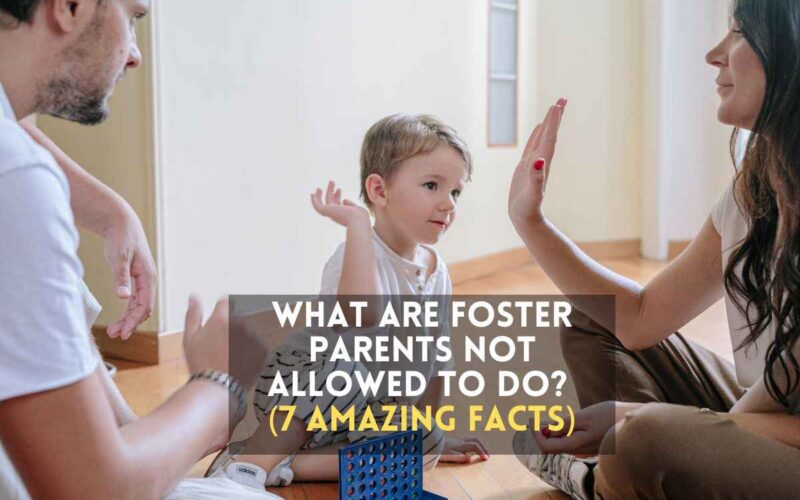Kids could either lost their biological parents and are either adopted or asked to stay with another family in other to be taken care of properly. It could be temporary, it could be permanent depending on the terms of agreement.
Sometimes their parents are not capable of providing those basic amenities for them, they could send them to another family hoping that they could be well taken care of. Individuals can also decide to take up the care of these children. This people now become their foster parents and are accountable to their well being during the period of time allocated to them.
However, these kids deserve same treatment and care as to other kids and do not deserve any form of ill treatment by their foster parents. This brings us to this article, which will be anchored on what foster parents are not allowed to do.
Who are foster parents?
Foster parents are individuals or families who provide temporary care for children who cannot live with their biological parents due to various reasons. Foster parents offer a safe and nurturing environment for these children while they are separated from their birth families. They play a crucial role in the child welfare system and help to meet the immediate and ongoing needs of children who require out-of-home care.
Foster parents can be individuals or couples, married or unmarried, and they come from diverse backgrounds. They may have different motivations for becoming foster parents, including a desire to make a positive difference in the lives of children, a wish to expand their own family, or a passion for helping those in need.
Foster parents go through a rigorous assessment process that includes background checks, home visits, interviews, and training to ensure that they are capable of providing a safe and supportive environment for the children in their care. They work closely with child welfare agencies, social workers, and other professionals to meet the specific needs of the children and support their well-being.
Foster parents are expected to provide for the basic needs of the children, such as food, shelter, clothing, education, and healthcare. They also offer emotional support, guidance, and stability during the child’s time in foster care. The ultimate goal is to either reunite the child with their biological family when it is safe and appropriate or find a permanent alternative, such as adoption or guardianship, if reunification is not possible.
Foster parents play a crucial role in the lives of children in need, providing them with a safe and caring environment during a challenging period of their lives.
What are foster parents not allowed to do?
Foster parents are responsible for providing a safe and nurturing environment for the children in their care. While specific regulations may vary depending on the jurisdiction, there are generally certain things that foster parents are not allowed to do. Here are some common restrictions placed on foster parents:
1. Physical punishment:
Foster parents are typically prohibited from using physical discipline or any form of corporal punishment on the children in their care. This includes actions such as hitting, slapping, or any other form of physical harm. They’re several ways to correct a child other than physical punishment, this may lead to visible scars or abuse on the child. Their bodies are still fragile, a hitting on the wrong place could pose a health issue on the child.
2. Neglect or abuse:
Foster parents are expected to provide adequate care, including food, shelter, clothing, and medical attention, to the children placed in their home. They are not allowed to neglect or abuse the children in any way, including emotional or psychological abuse. Continually reminding the children of their history/background as well as using bad words on them are prohibited, it may disrupt the emotional health of the children.
Kids are sensitive and they take cognisant of whatever you say to them which might lead them to feel less of themselves. No child deserves to be starved or neglected when sick, proper medical attention would be given to them. Under no circumstances should a foster parent leave a child outside throughout the night, they’re in your care and should be well taken care of.
3. Endangerment or unsafe environments:
Foster parents must maintain a safe and secure environment for the children. They are not allowed to subject the children to any form of endangerment, such as leaving them unsupervised in dangerous situations or exposing them to hazardous substances or conditions. Health and safety of a child should be considered in the course of their stay with you. If your environment is rough and not children friendly, always try as much as possible to keep them indoors or in the watch of an older person when stepping out.
Foster parents are not allowed to endanger any child’s life by sending them to places that might be harmful to them. The environment where they stay should be children friendly. Each child should be assigned to duties according to their age and capabilities, over working a child is not allowed.
4. Violation of privacy:
Foster parents are required to respect the privacy and confidentiality of the children in their care. They should not disclose personal information or share details about the child’s history or circumstances without proper authorization. That you know about the history of a child in your care doesn’t mean that you have to share it with anyone that cares to listen.
Those information were entrusted in your care in other for you to know how to relate with these kids, it was never meant to be out. The people you would share this information with might not know how to keep it and end up using it on the kids who will feel betrayed and sad. Do not violate their privacy by sharing it with anyone, they have a right for you to keep their information safe.
5. Discrimination or harassment:
Foster parents are expected to treat all children in their care with respect and dignity. They are not allowed to discriminate against children based on their race, ethnicity, religion, gender, sexual orientation, or any other protected characteristic. Harassment or any form of abusive behavior is strictly prohibited.
Most times, these kids in your care would come from a different background from yours, whatever grief you had with people of those ethnicity, religion, gender, religion, etc shouldn’t be used against those kids, they’re innocent and free, discriminating against them based on this reasons is not allowed by a foster parents who should be receptive and accommodative to every child despite their background.
6. Unauthorized placements or transfers:
Foster parents are generally not allowed to transfer or place a child in their care with another person or family without the proper authorization from the child welfare agency. They must follow the guidelines and procedures set by the relevant authorities.
Should you wish to travel or relocate or maybe you do not want to take care of the kids anymore, it is unlawful to place the children in your care with another individual or family without prior information, this is a breach of agreement and could be taken up against you despite your intentions. Foster parents are not allowed to put up any child in their care for adoption or as domestic servants. Should you not be able to cater for their anymore, it is advisable to return the kids other than take personal decisions.
Conclusion
It’s important to note that the specific rules and regulations governing foster care can vary depending on the jurisdiction, and foster parents should consult their local child welfare agency or foster care licensing agency for the precise guidelines and restrictions applicable to their situation.
This will help put you through during this period of foster care. Treat the child/children as if there yours and always report to your local child welfare situations that could be beyond your control about the child’s welfare, and never take up drastic decisions or measures about the children alone without consulting the authorities. Every child deserves to be loved.








